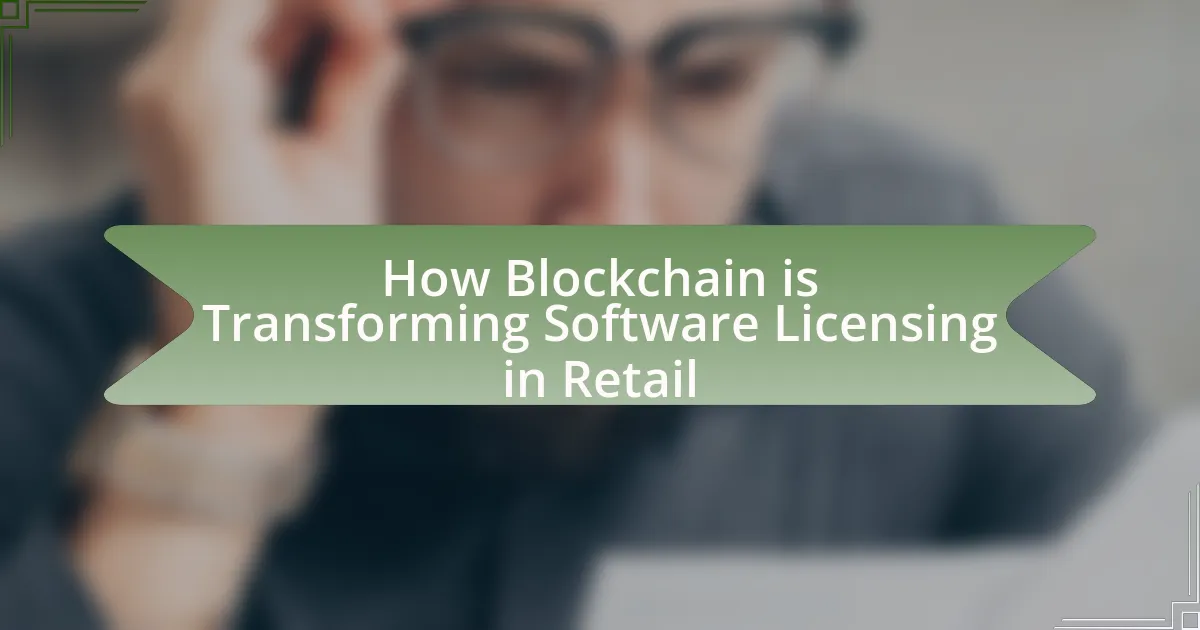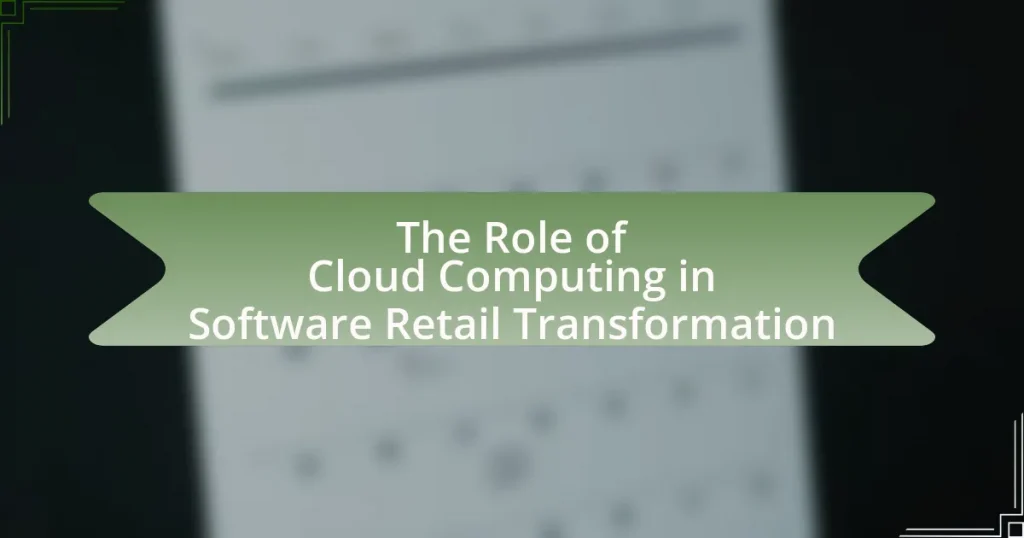Blockchain technology is revolutionizing software licensing in the retail sector by providing secure, transparent, and efficient management of licenses. Key features such as decentralization, immutability, and smart contracts enhance security and reduce the risk of piracy and unauthorized use. The article explores how blockchain improves compliance, reduces costs, and streamlines licensing processes while addressing challenges faced by traditional licensing models. Additionally, it discusses the implications for audits, regulatory considerations, and best practices for retailers adopting blockchain solutions in software licensing.
How is Blockchain Transforming Software Licensing in Retail?
Blockchain is transforming software licensing in retail by enabling secure, transparent, and efficient management of licenses. This technology allows retailers to track ownership and usage rights in real-time, reducing the risk of piracy and unauthorized use. For instance, smart contracts on blockchain can automate license agreements, ensuring compliance and reducing administrative overhead. According to a report by Deloitte, the use of blockchain in software licensing can decrease costs by up to 30% through improved efficiency and reduced fraud.
What are the key features of blockchain technology that impact software licensing?
The key features of blockchain technology that impact software licensing include decentralization, immutability, transparency, and smart contracts. Decentralization allows for a distributed ledger that eliminates the need for a central authority, reducing the risk of fraud and unauthorized access to software licenses. Immutability ensures that once a license is recorded on the blockchain, it cannot be altered or deleted, providing a permanent record of ownership and usage rights. Transparency enables all parties to view the licensing agreements and transactions, fostering trust among users and developers. Smart contracts automate the execution of licensing agreements, ensuring compliance and reducing administrative overhead. These features collectively enhance security, efficiency, and trust in software licensing processes.
How does decentralization enhance software licensing processes?
Decentralization enhances software licensing processes by increasing transparency and reducing fraud. In a decentralized system, each transaction is recorded on a blockchain, making it immutable and publicly accessible. This transparency allows stakeholders to verify licenses without relying on a central authority, thereby minimizing the risk of unauthorized use or piracy. Additionally, smart contracts can automate licensing agreements, ensuring that terms are enforced without the need for intermediaries. This efficiency not only streamlines the licensing process but also reduces costs associated with enforcement and compliance.
What role does transparency play in blockchain-based licensing?
Transparency in blockchain-based licensing ensures that all transactions and licensing agreements are recorded in an immutable ledger, allowing stakeholders to verify and audit the information easily. This transparency reduces the risk of fraud and unauthorized use, as every transaction is publicly accessible and traceable. For instance, a study by the World Economic Forum highlights that blockchain can enhance trust among parties by providing a clear and verifiable history of ownership and licensing rights, thereby fostering a more secure and efficient licensing environment in retail.
Why is blockchain adoption important for retail software licensing?
Blockchain adoption is important for retail software licensing because it enhances security, transparency, and efficiency in the licensing process. By utilizing blockchain technology, retailers can create immutable records of software licenses, reducing the risk of piracy and unauthorized use. This technology allows for real-time tracking of license ownership and usage, which can streamline compliance and auditing processes. Additionally, a study by Accenture found that blockchain could reduce licensing costs by up to 30% through improved management and reduced fraud. Thus, the integration of blockchain in retail software licensing not only protects intellectual property but also optimizes operational costs.
What challenges in traditional software licensing does blockchain address?
Blockchain addresses several challenges in traditional software licensing, including issues of transparency, security, and enforcement. Traditional licensing often suffers from a lack of visibility into usage rights, leading to disputes and unauthorized use. Blockchain’s decentralized ledger provides a transparent record of transactions, ensuring that all parties have access to the same information regarding licensing agreements. Additionally, traditional systems are vulnerable to piracy and fraud; blockchain enhances security through cryptographic techniques that make it difficult to alter or counterfeit licenses. Furthermore, enforcing compliance can be cumbersome in traditional models, but smart contracts on blockchain automate enforcement, ensuring that terms are met without the need for intermediaries. These features collectively improve the integrity and efficiency of software licensing processes.
How does blockchain improve security in software licensing?
Blockchain improves security in software licensing by providing a decentralized and immutable ledger that records all transactions related to software licenses. This technology ensures that each license is uniquely identifiable and traceable, reducing the risk of piracy and unauthorized use. The cryptographic nature of blockchain protects the integrity of the license data, making it nearly impossible to alter or forge licenses without detection. Additionally, smart contracts can automate compliance checks and enforce licensing terms, further enhancing security by ensuring that only authorized users can access the software.
What are the specific benefits of using blockchain for software licensing in retail?
The specific benefits of using blockchain for software licensing in retail include enhanced security, improved transparency, and streamlined processes. Blockchain technology provides a decentralized ledger that securely records all transactions, making it difficult for unauthorized parties to alter licensing agreements. This security reduces the risk of software piracy and fraud, which is a significant concern in retail.
Additionally, blockchain enables transparent tracking of software licenses, allowing retailers to verify the authenticity and ownership of licenses easily. This transparency fosters trust between software providers and retailers, as all parties can access the same information regarding licensing terms and usage.
Moreover, the automation of licensing processes through smart contracts on the blockchain can significantly reduce administrative overhead and errors. Smart contracts execute licensing agreements automatically when predefined conditions are met, leading to faster transactions and reduced costs associated with manual processing.
These benefits collectively enhance the efficiency and reliability of software licensing in the retail sector, making blockchain a transformative technology in this area.
How does blockchain reduce costs in software licensing?
Blockchain reduces costs in software licensing by enabling decentralized verification and management of licenses, which eliminates the need for intermediaries. This technology allows for direct transactions between software providers and users, reducing administrative overhead and potential fraud. For instance, a study by the World Economic Forum indicates that blockchain can reduce transaction costs by up to 90% in certain applications, demonstrating its efficiency in streamlining licensing processes.
What are the financial implications of blockchain for retailers?
The financial implications of blockchain for retailers include reduced transaction costs, enhanced supply chain transparency, and improved inventory management. By utilizing blockchain technology, retailers can eliminate intermediaries, leading to lower fees associated with payment processing and logistics. For instance, a study by Deloitte found that blockchain can reduce supply chain costs by up to 20% through increased efficiency and reduced fraud. Additionally, blockchain’s ability to provide real-time tracking of products enhances transparency, which can lead to better customer trust and potentially higher sales. Furthermore, improved inventory management through blockchain can minimize overstock and stockouts, optimizing cash flow and reducing holding costs.
How does blockchain streamline the licensing process?
Blockchain streamlines the licensing process by providing a decentralized and transparent ledger that securely records all transactions related to software licenses. This technology eliminates the need for intermediaries, reduces the risk of fraud, and ensures that all parties have access to the same verified information in real-time. For instance, with blockchain, software licenses can be issued, transferred, and tracked automatically through smart contracts, which execute predefined conditions without human intervention. This automation not only speeds up the licensing process but also minimizes administrative costs and errors, as evidenced by the implementation of blockchain solutions in various industries that have reported significant efficiency gains.
What impact does blockchain have on compliance and regulation in software licensing?
Blockchain significantly enhances compliance and regulation in software licensing by providing transparent, immutable records of transactions and license agreements. This transparency allows for real-time tracking of software usage and ownership, reducing the risk of piracy and unauthorized use. Furthermore, smart contracts on blockchain automate compliance checks, ensuring that licensing terms are adhered to without the need for intermediaries. For instance, a study by the World Economic Forum highlights that blockchain can streamline compliance processes, reducing costs associated with audits and legal disputes.
How does blockchain facilitate adherence to licensing agreements?
Blockchain facilitates adherence to licensing agreements by providing a decentralized and immutable ledger that records all transactions and interactions related to the licenses. This technology ensures that all parties involved have access to a transparent and tamper-proof record of the licensing terms, usage, and compliance. For instance, smart contracts on the blockchain can automate the enforcement of licensing conditions, triggering actions when specific criteria are met, such as usage limits or payment schedules. This reduces the risk of disputes and enhances trust among stakeholders, as the data cannot be altered without consensus. The use of blockchain in licensing has been supported by various studies, including research from the International Journal of Information Management, which highlights its potential to improve compliance and reduce administrative costs in software licensing.
What are the implications for audits and reporting with blockchain technology?
Blockchain technology significantly enhances audits and reporting by providing immutable records and real-time data access. This transparency allows auditors to verify transactions directly on the blockchain, reducing the time and effort required for traditional audit processes. Additionally, the decentralized nature of blockchain minimizes the risk of fraud, as all participants have access to the same data, ensuring consistency and accuracy in reporting. According to a study by the World Economic Forum, blockchain could reduce compliance costs by up to 30% due to its ability to streamline data verification and reporting processes.
What are the potential challenges of implementing blockchain in retail software licensing?
The potential challenges of implementing blockchain in retail software licensing include scalability issues, regulatory compliance, and integration with existing systems. Scalability is a concern because many blockchain networks struggle to handle a high volume of transactions efficiently, which can hinder real-time licensing verification. Regulatory compliance poses a challenge as different jurisdictions have varying laws regarding data privacy and digital transactions, complicating the implementation process. Additionally, integrating blockchain technology with legacy systems can be complex and costly, requiring significant investment in both time and resources to ensure compatibility and functionality.
What technical barriers exist for retailers adopting blockchain?
Retailers face several technical barriers when adopting blockchain, including scalability issues, integration complexities, and a lack of standardized protocols. Scalability challenges arise because many blockchain networks struggle to handle high transaction volumes efficiently, which can hinder retail operations that require rapid processing. Integration complexities stem from the need to connect existing systems with blockchain technology, often requiring significant changes to current infrastructure. Additionally, the absence of standardized protocols makes it difficult for retailers to implement blockchain solutions that can communicate effectively across different platforms and systems. These barriers can impede the seamless adoption of blockchain in retail environments.
How can retailers overcome integration challenges with existing systems?
Retailers can overcome integration challenges with existing systems by adopting blockchain technology, which facilitates seamless data sharing and interoperability. Blockchain provides a decentralized ledger that ensures data integrity and transparency, allowing different systems to communicate effectively without the need for extensive modifications. For instance, a study by Accenture highlights that 77% of executives believe blockchain can enhance supply chain transparency, which directly addresses integration issues by providing a unified view of transactions across various platforms. This capability reduces the complexity of integrating disparate systems, ultimately leading to improved operational efficiency and reduced costs.
What are the scalability concerns associated with blockchain technology?
Scalability concerns associated with blockchain technology primarily involve limitations in transaction throughput and speed. For instance, Bitcoin processes approximately 7 transactions per second, while Ethereum handles around 30 transactions per second, which is significantly lower than traditional payment systems like Visa, capable of processing over 24,000 transactions per second. These limitations can lead to network congestion, increased transaction fees, and slower confirmation times during peak usage, hindering the technology’s ability to support large-scale applications, particularly in sectors like retail where high transaction volumes are common.
What are the legal and regulatory considerations for blockchain in software licensing?
Legal and regulatory considerations for blockchain in software licensing include compliance with intellectual property laws, data protection regulations, and contract law. Blockchain technology can complicate the enforcement of software licenses due to its decentralized nature, which may challenge traditional licensing models. For instance, the use of smart contracts must adhere to existing legal frameworks to ensure enforceability, as highlighted by the European Union’s General Data Protection Regulation (GDPR), which mandates strict data handling and privacy standards. Additionally, jurisdictions may have varying regulations regarding the use of blockchain, necessitating awareness of local laws to avoid legal pitfalls.
How do current laws affect blockchain-based licensing models?
Current laws significantly impact blockchain-based licensing models by establishing the legal framework within which these technologies operate. Regulations concerning intellectual property rights, data privacy, and contract enforcement directly influence how blockchain can be utilized for licensing purposes. For instance, the Digital Millennium Copyright Act in the United States provides a legal basis for copyright protection, which affects how digital assets are licensed on blockchain platforms. Additionally, the European Union’s General Data Protection Regulation (GDPR) imposes strict data handling requirements that blockchain applications must comply with, thereby shaping their design and functionality. These legal frameworks ensure that blockchain-based licensing models adhere to existing laws, which can either facilitate innovation or impose limitations based on compliance requirements.
What future regulations might impact blockchain adoption in retail?
Future regulations that might impact blockchain adoption in retail include data privacy laws, consumer protection regulations, and financial compliance requirements. Data privacy laws, such as the General Data Protection Regulation (GDPR) in Europe, impose strict guidelines on how consumer data is collected and stored, which can affect blockchain’s decentralized nature. Consumer protection regulations may require transparency in transactions, influencing how blockchain systems are designed to ensure accountability. Additionally, financial compliance requirements, such as anti-money laundering (AML) and know your customer (KYC) regulations, could necessitate modifications in blockchain protocols to meet legal standards, thereby shaping the technology’s implementation in retail environments.
What best practices should retailers follow when implementing blockchain for software licensing?
Retailers should prioritize transparency, security, and interoperability when implementing blockchain for software licensing. Transparency ensures that all stakeholders can verify transactions and licensing agreements, fostering trust and reducing disputes. Security is critical, as blockchain technology provides a decentralized and tamper-proof ledger, protecting against unauthorized access and fraud. Interoperability allows different blockchain systems to communicate, enabling seamless integration with existing software and platforms. These best practices are supported by the inherent characteristics of blockchain, which include immutability and decentralized consensus, making it a robust solution for managing software licenses effectively.
How can retailers ensure a smooth transition to blockchain-based licensing?
Retailers can ensure a smooth transition to blockchain-based licensing by implementing a phased approach that includes training staff, integrating existing systems with blockchain technology, and collaborating with technology partners. This method allows retailers to gradually adapt to the new system while minimizing disruptions. Training staff ensures they understand blockchain’s functionalities and benefits, which is crucial for effective adoption. Integrating existing systems with blockchain technology helps maintain operational continuity and data integrity. Collaborating with technology partners provides retailers with the necessary expertise and resources to navigate the complexities of blockchain implementation, as evidenced by successful case studies in various industries that have adopted similar strategies.
What strategies can be employed to educate stakeholders about blockchain benefits?
To educate stakeholders about blockchain benefits, organizations can implement targeted workshops and seminars that focus on real-world applications and case studies. These educational sessions can demonstrate how blockchain enhances transparency, security, and efficiency in software licensing processes, which is particularly relevant in the retail sector. For instance, a study by Deloitte highlights that blockchain can reduce licensing fraud by providing an immutable record of transactions, thereby increasing trust among stakeholders. Additionally, creating informative content such as whitepapers and infographics can help distill complex blockchain concepts into easily digestible formats, further aiding stakeholder understanding.



